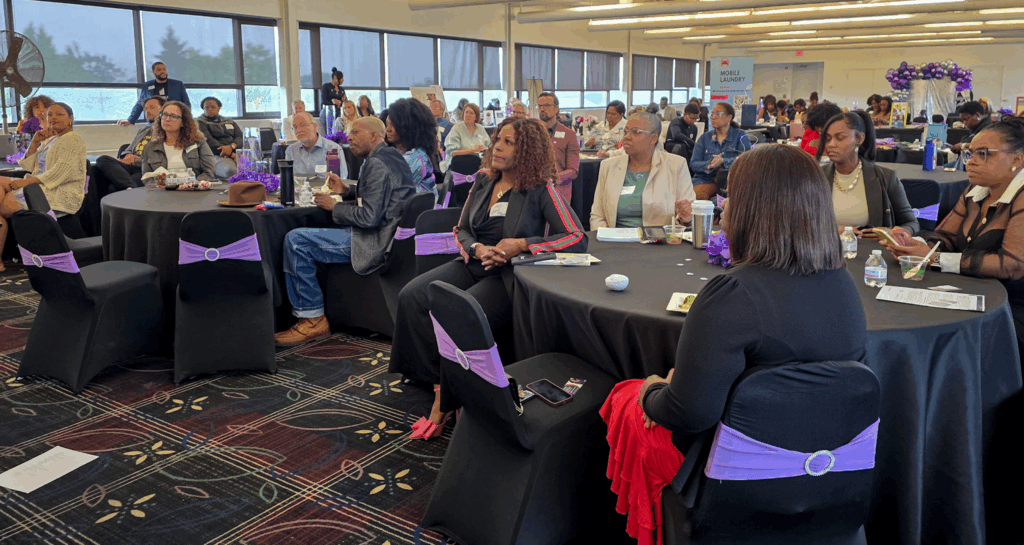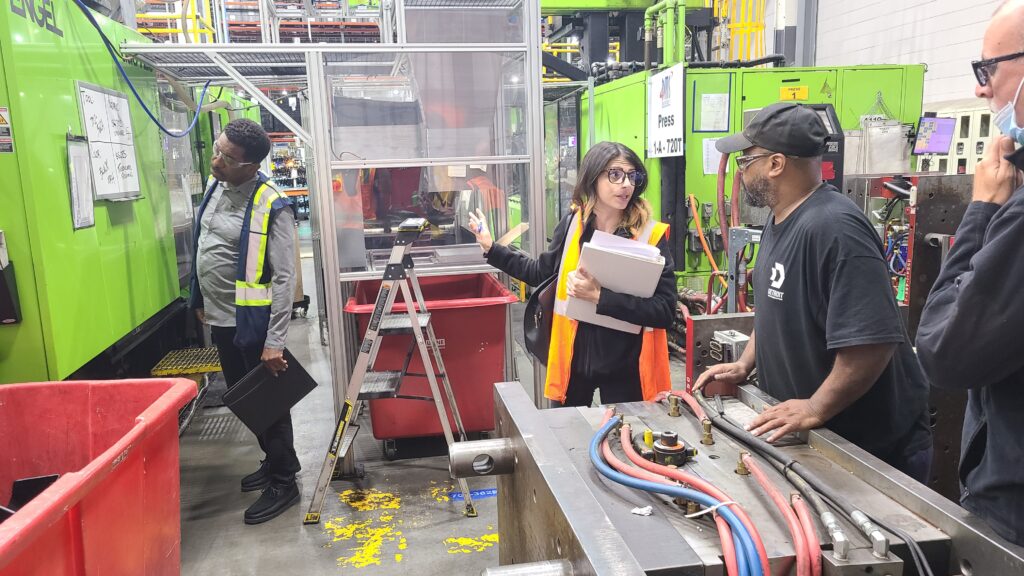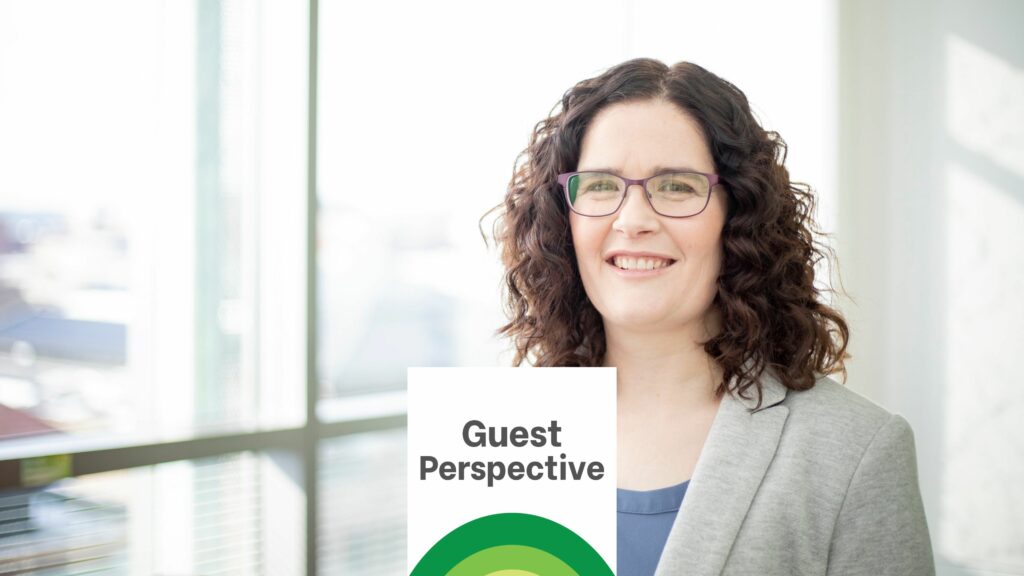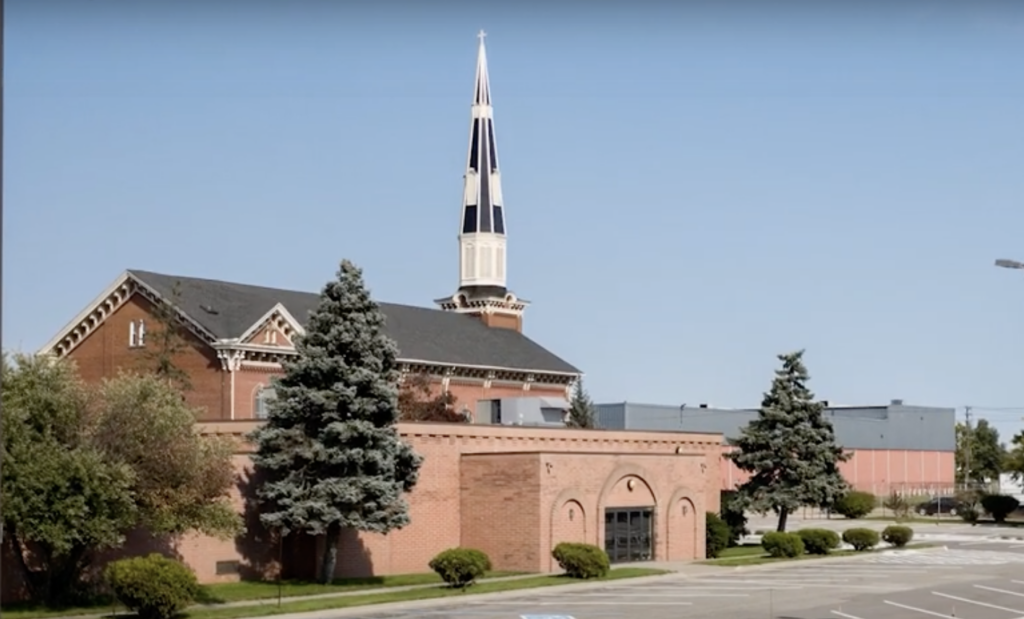Building a People-First Economy in Michigan

People First Economy is a statewide organization working to redefine what success in business looks like—where profitability, community wellbeing, and environmental stewardship go hand in hand. Through education, measurement tools, and peer networks, the nonprofit helps Michigan businesses integrate social and environmental values into everyday operations. SBN Detroit interviewed Carlos Martinez, president of People First Economy, about shifting business mindsets, the growing connection between sustainability and profitability, and why Michigan is uniquely positioned to lead the next economy. Q: Tell me about People First Economy and how it came to be. A: At its core, People First Economy is about building tools and support networks that help shape an economy where people and environmental well-being are essential. We never shy away from the idea of the triple bottom line — businesses can absolutely make a healthy profit while supporting the communities they serve and the environment they depend on. We now serve more than 500 businesses statewide, from early-stage entrepreneurs to established companies. Much of our work centers on education and foundational business practices, but always through the lens of sustainability and inclusion. We started as Local First, which focused on supporting locally owned companies. Over time, our mission expanded to include environmental and social impact — because local economies thrive when businesses are sustainable, equitable, and community-driven. Q: As you work with cohorts, what mindset shifts do you see as companies move toward more inclusive, sustainable practices? A: The biggest shift happens when leaders stop viewing sustainability as an add-on and start seeing it as core to their business strategy. Once companies begin measuring their social and environmental impact, they start acting more proactively. Sustainability becomes part of how they innovate, manage costs, and create value. For larger or more mature businesses, this often leads to a broader cultural shift. They begin evaluating suppliers, employees, and even competitors differently — not as transactions, but as part of a shared ecosystem. That mindset unlocks collaboration and innovation. When companies realize that solving sustainability challenges can actually drive profitability, real transformation begins. Q: What tangible benefits do companies see when they measure their social and environmental impacts? A: One of the biggest is employee engagement. When people see that their company is making a positive difference, they feel connected to something larger than their job. We also see efficiency gains, cost savings from smarter resource management, and stronger brand loyalty. But there’s another layer — storytelling. When businesses can measure their impact, they can share those results in powerful ways. It becomes part of their identity. For example, Walker-Miller Energy Services and Cascade Engineering in Michigan both demonstrate how sustainability and inclusion strengthen brand reputation and build employee pride. More companies are now including impact reporting in their marketing or RFP materials because it helps them stand out. When you can prove your values, you open doors to new opportunities. A Harvard study recently found that purpose-driven companies embedding sustainability into their culture outperform the market nearly tenfold over two decades. That connection between purpose and profit is real. The business impact strategies create lasting value when they’re grounded in a deep understanding of a company’s financial metrics. Q: How do you encourage businesses to think about long-term value rather than short-term profit? A: This is always an evolving conversation, especially in challenging economic times. The key is understanding that we’re all interconnected. A diverse, resilient business community helps protect against national downturns and future disruptions. Companies that invest early in sustainable, innovative practices often find themselves better positioned when the market shifts. Patagonia is a good example — years ago, they were experimenting with regenerative agriculture, which at the time seemed niche. Today, it’s a standard for sustainable production. When you build trust, brand loyalty, and local supply chains, it creates stability. Over the long term, that stability translates to profitability. Q: Detroit and Michigan have a rich manufacturing legacy. How is the people-first model reshaping the regional narrative around business and jobs? A: Detroit is unique because it already has a strong foundation of community-based leadership. Other states look to Detroit as a model for what’s possible when innovation and inclusion go hand in hand. We’re still early in the process of embedding this mindset more broadly, but the momentum is there. When we opened applications for our latest sustainability cohort, we had more than 50 applicants for just 20 spots — which tells us there’s real appetite for this work. Our broader goals include connecting early-stage businesses with those further along in their sustainability journey — through tools, mentorship, and experiences like conferences where they can see what’s possible. It’s about building a community of practice. The more we connect those dots, the stronger our local economy becomes. Q: If you were advising a mid-size company in Detroit today, what’s the best first step toward embedding people-first practices? A: Start by understanding where you are. We always recommend beginning with a sustainability or impact assessment. Then pick one or two achievable goals, such as improving employee benefits, reducing waste, or sourcing locally. Progress happens through small, transparent steps, not perfection. I’m an entrepreneur myself, and when I first took an assessment myself, I panicked — but that’s the point. It’s about identifying opportunities for improvement, not judgment. Once you see where you can make a change, momentum builds. It’s a marathon, not a sprint. Q: Where do you see the biggest growth opportunities for Michigan businesses in the next five years? A: Growth lies at the intersection of sustainability, equity, and innovation. The clean energy transition alone represents a multi-trillion-dollar opportunity. There’s also growing potential in circular manufacturing and workforce development and worker-owned cooperatives. We need to make sure those opportunities are equitable. Detroit has a majority Black population, and Michigan has several key regions with strong, diverse, but underserved communities. As major investments flow into green energy and infrastructure, it’s vital that local entrepreneurs and workers share in that growth. This is still a foundational phase. Some of the biggest
As Recycling Grows, So Does the Need for New Strategies, Technology

In 1995, after graduating from the College for Creative Studies with a degree in industrial and product design and an eye toward bettering the environment, Keith Zendler founded Environmental Services of North America Inc. in Detroit. Nearly thirty years later, the company retooled and relaunched to focus on waste management and upgraded its technology to help it expand and improve its services and expand its network of partners domestically and globally. We interviewed founder and owner Keith Zendler to learn more. Q: Tell us about RecycleMax. A: RecycleMax is a tech-based reboot of a company I founded in 1995. At that time, we had a plant in Detroit and a fleet of 14 trucks and we were focused mainly on paper and similar recyclables. We now provide the environmentally sound management of virtually all solid and liquid waste materials. I have always been interested in sustainability from a community standpoint – in building stronger and more sustainable communities through technology. So, I sold the original recycling company in 2008 and started a civic tech company focused on designing an online community network for people and organizations to better work together. Through this company, I launched a multisided SaaS platform with the intent of improving stakeholder communication, collaboration, and engagement to help leaders solve political, health, social, environmental, and economic issues. Eventually, I realized I could apply this technology to the recycling industry and provide businesses with robust and customized waste management programs that help them meet their sustainability goals and reduce their carbon footprint. So, RecycleMax was relaunched as a tech-based company in 2020. We use the same technology we offer clients internally for our operations. The crux of the platform is its ability to facilitate a community network and real-time communication. We have used it to build a global network of recyclers and haulers that we can leverage for clients. Q: How is the industry different now, than in the 1990s? A: There was a time when we had to push companies to recycle, and they would only do so if we could show that it either saved them money or at the very least did not incur additional expenses. That is no longer the driver. Companies are doing it now no matter what. That is a surprising shift. We work heavily in the auto industry, and I’ve been amazed at how progressive these companies are and how seriously the industry is taking environmental measures. Adding to that, until recently, most of our recyclables were shipped overseas, and we relied on China to handle them. A lot of waste was ending up in the ocean. China shut that off and it certainly caused a disruption, but ultimately it made the industry stronger. There are more and more companies being established in the U.S. to handle these materials. The industry has made a tremendous amount of progress, and it’s exciting. Q: Who are some of your customers in Detroit and Southeast Michigan? A: Union Tank Car Company, Detroit Manufacturing Systems, Fishbeck, and Piston Automotive to name a few. Q: In your experience, what are the challenges companies face with recycling? A: Education and incentivization. Employees often need to be trained in why and how to recycle and handle their waste materials. It’s also vitally important for individuals to understand the difference they are making. Providing that data offers motivation to continue the momentum toward success. Q: What are the biggest challenges you see that businesses have with waste management? A: Participation is probably the biggest challenge. Companies need all employees on board. Training and education are critical to a successful recycling program. There is still a lot of work to do in getting people to take recycling seriously. Plastic is another big challenge for the industry. There are types of plastics that are not commonly recycled due to the unique resins involved. It can become difficult for companies to manage this. Trucking and logistics are a challenge as well. Transportation costs can be the biggest component when it comes to recycling. Q: What are the biggest opportunities? A: I think there is a massive global opportunity in recycling. And by applying technology, the potential to streamline efficiencies is huge. I never thought I’d be in recycling for over thirty years, but It’s a wonderful industry. It feels good to be able to help businesses meet their recycling and waste management goals and do their part to better the environment. Be sure to subscribe to our newsletter for regular updates on sustainable business practices in and around Detroit.
Moving Toward a More Just and Sustainable Future in Southeast Michigan

Sara Soderstrom is an associate professor in Organizational Studies and Program in the Environment and the Erb Undergraduate Fellows faculty director at the University of Michigan. Sustainability has evolved significantly over the years. At the University of Michigan’s Erb Institute for Sustainability in Business, this evolution includes working toward market transformation: business transforming the market to make it more sustainable. We can’t be thinking only: ‘How do we do less bad? How do we pollute less? How do we use fewer resources?’ We need to actually think about ‘How do we do more good?’ That fundamentally pivots the way that you think about business—it’s much more of a proactive than reactive conversation. It also centers justice in a way that early business sustainability didn’t. This shift changes the local vs. global dynamic to consider the local as part of the global system, and it sharpens the focus on small and midsize businesses. It also considers supply chains and key stakeholders more broadly. A study that I conducted with Kathryn Heinze, associate professor in the School of Kinesiology at the University of Michigan, shows some of the ways these shifts are happening. The study focused on the nonprofit FoodLab, which was operating in Detroit at the time. FoodLab aimed to promote healthy, environmentally sustainable, and accessible food systems and to grow a good food economy by working with its members: local food entrepreneurs. One thing that we realized as we were working with local entrepreneurs was a focus on being embedded in place—what is Detroit? What is the commitment to the city? What is the future for the city we envision? And how do we place ourselves in that future as entrepreneurs? With this network of businesses, there was a strong motivation not just for the financial viability of the business, but for doing good through business. But at the same time, these entrepreneurs have resource constraints, so there are tradeoffs. How do you balance things like a living wage with ensuring composting or locally sourced materials? FoodLab helped ease some of these constraints by serving as a connector that lowered the barriers to entry around sustainability. This way, each entrepreneur didn’t need to have all the answers or all the resources—they could get the information they needed about sourcing, financing, or best practices through the network. FoodLab functioned as part incubator, part social movement organization, connecting folks with these shared interests to collectively learn, but also as the space that could aggregate these resources and make them accessible to people, so that they could more effectively move forward towards sustainability and justice goals. FoodLab asserted that they couldn’t have a just and sustainable food economy if there wasn’t engagement, ownership, and voice from diverse entrepreneurs that reflect the City of Detroit. So they had a lot of intentionality around diversity and engagement, both in who was participating as entrepreneurs in the network, but also in what they were prioritizing as their goals as an organization. It was centering equity and justice in almost every conversation and decision they were having. The ways that FoodLab built its organizational practices and structured conversations made sure that everyone involved felt like they were heard, even in contentious conversations, which built trust and helped them move collectively towards this more just and sustainable imagined future. The Erb Institute – a partnership of the Ross School of Business and the School for Environment and Sustainability at the University of Michigan -. works to create a sustainable world through the power of business. Somewhat like FoodLab, we also serve as an enabling network. The students are the key actors, We are the convener, and then the network continues with alumni who are now 10 to 20 years out but still lean into us and each other for support as they work toward solutions to sustainability and justice challenges. Two of our key programs are: Impact Projects, through which students design projects, often working directly with businesses or partnering with businesses and community partners on organization-led projects. The projects give businesses access to students who have time, expertise, and passion around sustainability and justice efforts, who can help them focus on an issue—such as supply chain, procurement, or skills redevelopment. Erb on the Road, which brings both graduate and undergraduate students to businesses, nonprofits, and other organizations across Michigan. The program allows students to engage with a variety of different types of businesses and nonprofits that are focused on local sustainability challenges and figure out solutions for them. For undergrads specifically, what has been powerful is hearing them reflect on learning what is happening locally—which makes what we talked about in the textbook real—but their experiences are helping them recognize that business and sustainability is an available career path. People are committed to sustainability in myriad ways, and you don’t need to wait until you are chief sustainability officer to do sustainability. The Erb Institute is focused on preparing future leaders – and also service to the state of Michigan. We want students to recognize that being part of the University of Michigan isn’t just the Ann Arbor campus – it’s also the state and world. So we work to help focus that commitment to: What does it really mean to be the leaders and the best? Supporting and engaging locally in Detroit and across Michigan is part of that. Be sure to subscribe to our newsletter for regular updates on sustainable business practices in and around Detroit.
Dan Carmody, Eastern Market Partnership CEO, Talks About Building Opportunity, Economy and a Stronger Regional Food System

Dan Carmody, Eastern Market Partnership CEO since 2007, spoke with SBN Detroit on the market’s positioning towards sustainable practices. Carmody is responsible for shepherding the 127-year-old, public market to nourish a healthier, wealthier, and happier Detroit. EMP operates one of the largest public markets in the United States, oversees a program of capital investments to rebuild the market, serves as the economic development organization to nurture and expand the Eastern Market District, manages a host of food access programs to improve Detroit diets, and builds an ecosystem to support Detroit food entrepreneurs. Carmody has led Eastern Market to become a national thought leader in developing new templates for how to repurpose urban vacant land and resurrect regional food systems. We talked to Carmody about EMP’s sustainability strategies. Q: Where do EMP’S strengths lie in terms of sustainability? A: Put quite simply, we work to help build a stronger regional food system to make us less reliant on large industrial food systems. There are not enough public markets in the U.S. that serve to support independent small businesses. Public markets are the original “pop up.” Small startups and entrepreneurs can pay the fee to rent a stall or tent and get moving on their business. We need more places like that around the country to help small businesses and not be so dependent on big companies. Q: What does sustainability mean to the market? A: It means that farmers are being compensated for crops in a fashion that allows financial success. It means farmers and growers embracing business practices that help us steward the earth in better ways than we are now. How do you approach partnering with sustainable companies in the food and agriculture industries? A: Two things I can point to that we work on are first, helping to make solar options more viable, and second, helping businesses work stormwater management into their practices to reduce the cost of operation and decrease the amount of stormwater run-off into the Detroit River. Q: How does the addition of these new entities move sustainability forward in Eastern Market? A: The new Mosaic food hall will be located at 3500 Riopelle St. in the former Detroit Water Department building. This building hasn’t been occupied since 1999, so the mere act of utilizing an existing building versus tearing it down and starting over is in itself a very significant sustainable practice. EW Grobbel, who’s been selling corned beef and other foods since the 1970s, will open a new grocery store and deli, creating 300 new jobs and offering local farmers a great venue to sell. These are two great examples of growth occurring now that help move sustainability forward. Q: Looking back eight to ten years, what was your selling point then to bring businesses into the market and also to approach sustainability with them? How has that changed? A: It has not changed much. We look for partners in the food sector and others that build the market as a regional food hub and also improve the business mix for the retail consumer supply and demand. There is an authenticity to the market that has always been there and is still today. Its focus is on independent businesses and if anything, we are becoming more vocal to make sure it remains this way as property values increase. Q What partnerships do you value when it comes to sustainability? A: One that comes to mind is our partnership with The Nature Conservancy in helping businesses design and implement stormwater management systems. This has been going on for several years. We piloted a conversion of a parking lot to retain stormwater at Sacred Heart Church in the Market District that resulted in the reduction of stormwater runoff and reduced their water bills greatly. Throughout our expansion, The Conservancy is helping us as we identify future buildout plans and repurpose urban land for industrial and commercial use to build in stormwater management systems as we go. Q: What can you tell us about the new expansion of the market? A: The expansion involves 25 to 30 acres and a $1 million food processing and distribution space. Again, this will bring new jobs to the Market District, more healthy food options for people in nearby neighborhoods, and vitality and growth to the whole district. Eastern Market has one of the largest footprints of any public market in the country – and we have the space and the means to go bigger. We’ve worked over time to bring in more value-added makers, and now the market is a viable market on Saturday all year and the expansion will strengthen that. From an economic standpoint, we work to offer more opportunities to entrepreneurs to help them grow, and we will continue to do so. We’ve received funding from the state to build what we are referring to as Shed X – a new wholesale distribution facility for regional farmers. Since 1891 farmers have come to the market between midnight and 6 am to sell to independent grocers. This has shrunk over the years and we are down to about 40 million pounds per year. This is not small, but it’s also not big in terms of food distribution. We hope to grow this by building a new, modern facility with refrigeration and docks that the farmers can more efficiently use. We’ll utilize solar lighting and stormwater management within this facility. All of this will serve to help the local economy, and the diversification creates and keeps jobs in the city. Be sure to subscribe to our newsletter for regular updates on sustainable business practices in and around Detroit.


